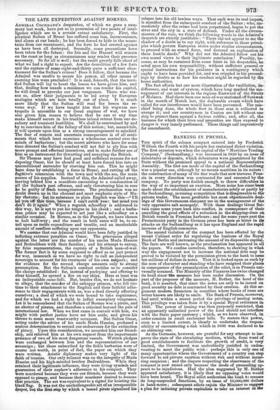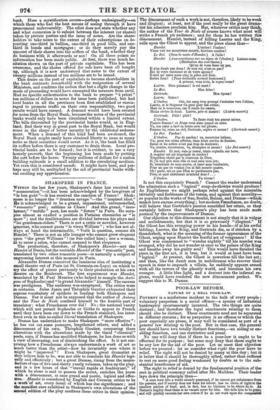BANKING IN PRUSSIA.
THE spirit of the solemn compact entered into by Frederick. William the Fourth with his people has sustained direct violation. The first occasion was when the capital of the " Maritime Trading Company," (Seehandlung,) was increased in 1820 by an issue of debentures or deposits, which debentures were guaranteed by the State without the promised appeal to a national Representative Assembly. The first use made of the capital of the Seehandlung was a popular one, although by no means maritime in its nature : the construction of many of the fine' roads that now traverse Prus- sia in every direction was contracted for and executed by the company. No party was foolish enough to throw difficulties in the way of so important an exertion. More noise has since been made about the establishment of manufactories solely or partly by the Seehandlung, as raising competition that is disagreeable to the' private trader. The most, profitable but most objectionable deal- ings of this Government company are in the management of the very oppressive salt monopoly. With these dealings Great Bri- tain came some years back into conflict, in consequence of their annulling the good effects of a reduction in the shipping-dues on British vessels in Prussian harbours ; and for some years past the. Protectionist party in the German press has been as bitter in itat attacks on the Sechandlung as it has upon England and the rapid increase of English commerce. The second violation of the compact has been effected by the recent Cabinet order for regulating the business of the Royal Bank of Berlin and increasing the amount of its disposable capital. The facts are well known, as the proclamation has appeared in all the papers. We confine ourselves, therefore, to showing in what way the engagement not to increase the national debt may be proved to be violated by the permission given to the bank to issue ten millions of dollars in notes. That it is looked upon as such by the men of character and standing who have resigned their places in consequence of the promulgation of the edict, is in Prussia uni- versally assumed. The Ministry of the Finances has twice changed its head since the measure has been under discussion. On the part of the proposer of the measure, M. Rother, the head of the bank, it is asserted, that since the notes are only to be issued on good security no debt is contracted by their creation. At this ar- gument modern financiers in countries where banks of issue are better known are likely to smile. The Bank of Prussia, moreover, had until within a recent period the privilege of issuing notes. This privilege was taken from it by a special 'Royal ordinance is 1836. The power of issuing was then purposely restricted, that an apparently unlimited power of the kind should not interfere with the State paper currency ; which, as we have observed, hi order consists in small exchequer bills. To restore this power, even to a limited extent, is clearly to undertake the respon- sibility of encountering a risk which in 1836 was declared to be an alarming one.
As the Germans, however, are grateful for any attempt to im- prove the state of the circulating medium, which, from want of good establishments to facilitate the growth of credit, is very limited, the Government was undoubtedly justified in endea- vouring to meet the public wish : perhaps this is only one of many opportunities where the Government of a country can step forward to aid private exertion without risk and without incur- ring suspicion ; and the dispute respecting the observance of the compact is now raised only because the mode of proceeding ap- pears to be injudicious. Had the plan suggested by M. Bother appeared satisfactory, it is likely that no opposing voice would have been heard. The Royal edict authorizes the bank to resume its long-suspended functions, by an issue of 10,000,000 dollars in bank-notes ; subsequent edicts enjoin the Minister to suggest a plan for inducing private capitalists to take an interest in the
bank. Here a mystification occurs--perhaps undesignedly—on which those who had the best means of seeing through it have pronounced unfavourably. The edict does not state whether any and what connexion is to subsist between the interest (or shares) taken by private parties and the issue of notes. Are the share- holders to take notes to the extent of their subscriptions on de- positing one-third in bullion, one-third in good bills, and one- third in bonds and mortgages ; or do they merely pay the amount of their shares into the coffers of the bank, whether they do business with it afterwards or not? On all these points no information has been made public. At first, there was much he- sitation shown on the part of private capitalists. This has been overcome, and the shares offered for sale have been all bought up, although it is now understood that notes to the extent of twenty millions instead of ten millions are to be issued.
This desire on the part of capitalists to become shareholders in the bank contrasts remarkably with the resignation of several Ministers, and confirms the notion that but a slight change in the mode of proceeding would have exempted the measure from cavil. Had no specific authorization to the bank to prepare "a priori" ten millions of dollars in notes for issue been published, but had local banks in all the provinces been first established or encou- raged to promote traffic on their own responsibility, two good results would have ensued. A demand would have been created for notes from the Royal Bank, because the notes of the provincial banks would only have been circulated within a limited extent. The bills discounted by the provincial banks would, as in Eng- land, find their way in great part to the Royal Bank, but would come in the shape of better security by the additional endorse- ment. When a demand of this kind had been awakened, the Royal Bank might easily have obtained liberty to issue as many notes as their securities would cover. As it is, the bank has filled its coffers before there is any customer to drain them. Local pro- vincial banks are to be formed ; but it is evident, to use a very homely proverb, that the beginning has been made by putting the cart before the horse. Twenty millions of dollars for a nation building railroads is a small addition to the circulating medium. Yet even this is considered unsafe. It might have been, and per- haps may still be, multiplied by the aid of provincial banks with- Out exciting any apprehension.



























 Previous page
Previous page